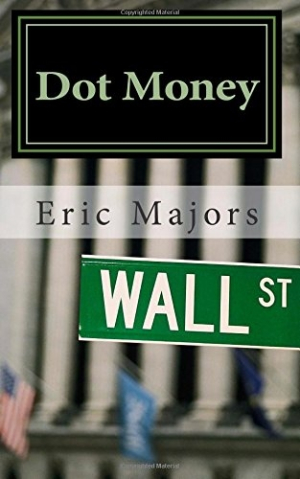Dot Money
A financial market analyst proposes a bold approach to fixing the world’s economy.
Eric Majors has an ambitious goal: to offer “the framework of a new economy that can potentially end poverty, establish global economic stability and help each individual to realize their true potential as a human being.” If this isn’t enough, the author’s concept also involves creating a new currency.
With this premise, it would be hard to imagine that Dot Money could be anything but highly controversial and, to some readers, unrealistic. However, Majors manages to build a well-documented case for his ideas through a comprehensive study in the book’s first three parts—the concept of money; the manner in which most countries create, manage, and distribute money; and what the author calls “The Futility of Current Global Monetary Policies.”
It is part 4, which occupies more than half the book, that readers will find the most intriguing. Here, Majors writes at length about “a better monetary policy.” He likens the stock market to a casino, but later he writes that to “attain economic freedom and stability,” the manner in which the stock market functions can be applied “to the money supplies of the world.” According to the author, “countries need to start treating their currencies as shares of any other business and valuing them based on the same fundamentals as that of stocks.”
The book’s plan is spelled out in great detail, some of which is sure to be startling. Majors proposes, for example, that the U.S. should immediately issue enough money to pay off the national debt, permanently end income tax, and “replace all social welfare expenditures with a single monthly minimum income payment to all U.S. citizens regardless of their residence and earnings.” The author includes financial charts to back up his claims that the plan is sustainable. He also proposes the creation of a global virtual currency, “Dot Money,” derived from assigning a dot to a particular monetary value. Writes Majors, “if people started using the Dots around the world then I will have unilaterally fixed the rates of all global currencies. … If Dot users just agreed not to exchange Dots with other currencies for any amounts that were outside of the fixed rates then the system would work.”
Clearly, Majors knows that his radical notions will be met with spirited resistance, so he wisely includes an entire chapter of questions and answers. Several of his questions (such as “This will never work. Do you honestly believe that the bankers, the rich and politicians who control the world would pay people for nothing?”) are shrewdly designed to raise the most serious objections so he can answer them rationally and thoughtfully. Several appendixes and a rich bibliography are helpful, although one might question the inclusion of Bible verses that relate to welfare.
Unfortunately, the book is marred by occasionally dense paragraphs, overwhelming detail, and typographical errors.
Dot Money is far-reaching in its intent and compelling in its audaciousness. For those unafraid to consider a vast overhaul of the world’s monetary system, Dot Money is a real eye-opener.
Reviewed by
Barry Silverstein
Disclosure: This article is not an endorsement, but a review. The publisher of this book provided free copies of the book and paid a small fee to have their book reviewed by a professional reviewer. Foreword Reviews and Clarion Reviews make no guarantee that the publisher will receive a positive review. Foreword Magazine, Inc. is disclosing this in accordance with the Federal Trade Commission’s 16 CFR, Part 255.

